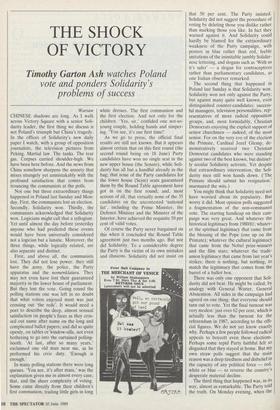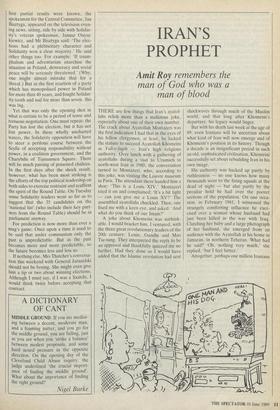THE SHOCK OF VICTORY
Timothy Garton Ash. watches Poland
vote and ponders Solidarity's problems of success
Warsaw CHINESE shadows are long. As I walk across Victory Square with a senior Soli- darity leader, the first thing we discuss is not Poland's triumph but China's tragedy. In the offices of Solidarity's new daily paper I watch, with a group of opposition journalists, the television pictures from Peking. Martial law. The tanks. The tear gas. Corpses carried shoulder-high. We have been here before. And the news from China somehow sharpens the anxiety that mixes strangely yet unmistakably with the profound satisfaction that comes from trouncing the communists at the polls.
Not one but three extraordinary things happened in Poland last Sunday and Mon- day. First, the communists lost an election. Secondly, Solidarity won. Thirdly, the communists acknowledged that Solidarity won. Logicians might call that a syllogism. Yet until almost the day before yesterday anyone who had predicted these events would have been universally considered not a logician but a lunatic. Moreover, the three things, while logically related, are also separate and distinct.
First, and above all, the communists lost. They did not lose power: they still have the army, the police, the Party apparatus and the nomenklatura. They may not even have lost their guaranteed majority in the lower house of parliament. But they lost the vote. Going round the polling stations one was left in no doubt that what voters enjoyed most was just crossing out 'the reds'. It would need a poet to describe the deep, almost sensual satisfaction on people's faces as they cros- sed out name after name on the long and complicated ballot papers; and did so quite openly, on tables orwindow-sills, not even bothering to go into the curtained polling- booth. 'At last, after so many years,' exclaimed one old man near me, as he performed his civic duty. 'Enough is enough.'
In many polling stations there were long queues. 'You see, it's after mass,' was the explanation given me in almost every case; that, and the sheer complexity of voting. Some came directly from their children's first communion, trailing little girls in long white dresses. The first communion and the first election. And not only for the children. 'Yes, sir,' confided one not-so- young couple, holding hands and simper- ing. 'You see, it's our first time!'
As we go to press, the official final results are still not known. But it appears almost certain that on this first round (the second round being on 18 June) Party candidates have won no single seat in the new upper house (the Senate), while Soli- darity has all but a handful already in the bag; that none of the Party candidates for the lower house (Sejm) seats guaranteed them by the Round Table agreement have got in on the first round; and, most serious of all, that virtually none of the 35 candidates on the uncontested 'national list', including the Prime Minister, the Defence Minister and the Minister of the Interior, have achieved the requisite 50 per cent of valid votes.
Of course the Party never bargained on this when it concluded the Round Table agreement just two months ago. But nor did Solidarity. To a considerable degree the Party is the victim of its own mistakes and illusions. Solidarity did not insist on that 50 per cent. The Party insisted. Solidarity did not suggest the procedure of voting by deleting those you dislike rather than marking those you like. In fact they warned against it. And Solidarity could hardly be blamed for the extraordinary weakness of the Party campaign, with posters in blue rather than red, feeble imitations of the inimitable jumbly Solidar- nosc lettering, and slogans such as 'With us it's safer' — a slogan for contraceptives rather than parliamentary candidates, as one Italian observer remarked.
The second thing that happened in Poland last Sunday is that Solidarity won. Solidarity won not only against the Party, but against many quite well known, even distinguished counter-candidates: success- ful managers, television personalities, rep- resentatives of more radical opposition groups, and, most formidably, Christian Democrats enjoying the explicit support of senior churchmen — indeed, of the most senior. For on the very eve of the election the Primate, Cardinal Jozef Glemp, de- monstratively received two Christian Democrat candidates who were standing against two of the best known, but distinct- ly secular Solidarity activists. Yet despite that extraordinary intervention, the Soli- darity men still won hands down. (`The Primate should submit his resignation,' murmured the wits.) You might think that Solidarity need not have worried about its popularity. But worry it did. Most opinion polls suggested a fragmentation of the non-communist vote. The starting handicap on their cam- paign was very great. And whatever the historical legitimacy from 1980/81; whatev- er the spiritual legitimacy that came from the blessing of the Pope (one up on the Primate); whatever the cultural legitimacy that came from the Nobel prize-winners and the film stars; whatever the trade- union legitimacy that came from last year's strikes; there is nothing, but nothing, to match the legitimacy that comes from the barrel of a ballot box.
There was only one opponent that Soli- darity did not beat. He might be called, by analogy with General Winter, General Abstention. All sides in the campaign had agreed on one thing: that everyone should turn out to vote. Yet the final turnout was very modest: just over 62 per cent, which is actually less than the turnout for the referendum in 1987, according to the offi- cial figures. We do not yet know exactly why. Perhaps a few people followed radical appeals to boycott even these elections. Perhaps some tepid Party faithful felt so disgusted that they stayed at home. But my own straw polls suggest that the main reason was a deep tiredness and disbelief in the capacity of any political force — red, white or blue — to reverse the country's desperate material decline. The third thing that happened was, in its way, almost as remarkable. The Party told the truth. On Monday evening, when the first partial results were known, the spokesman for the Central Committee, Jan Bisztyga, appeared on the television even- ing news, sitting, side by side with Solidar- ity's veteran spokesman, Janusz Onysz- kiewicz, and Mr Bisztyga said: 'The elec- tions had a plebiscitary character and Solidarity won a clear majority.' He said other things too. For example: 'If trium- phalism and adventurism anarchise the situation in Poland, democracy and social peace will be seriously threatened.' (Why, one might almost mistake that for a threat.) But as the first reaction of a party which has monopolised power in Poland for more than 40 years, and fought Solidar- ity tooth and nail for more than seven, this was big. Yet that was only the opening shot in what is certain to be a period of tense and tortuous negotiation. One must repeat: the Party has lost the election, but it has not lost power. In these wholly uncharted waters, the Solidarity opposition will have to steer a perilous course between the Scylla of accepting responsibility without power, in a coalition government, and the Charybdis of Tiananmen Square. There will be much passing of poisoned chalices. In the first days after the shock result, however, what has been most striking is the efforts of the top political leadership on both sides to exercise restraint and reaffirm the spirit of the Round Table. On Tuesday some Solidarity leaders went so far as to suggest that the 35 candidates on the 'national list' (who include their key part- ners from the Round Table) should be in parliament anyway. For prediction is now more than ever a mug's game. Once upon a time it used to be said that under communism only the past is unpredictable. But as the past becomes more and more predictable, so the future becomes less and less so.
If nothing else, Mrs Thatcher's conversa- tion this weekend with General Jaruzelski should not be boring. She might even give him a tip or two about winning elections. Although I must say, if I was a Saatchi, I would think twice before accepting that contract.



























































 Previous page
Previous page